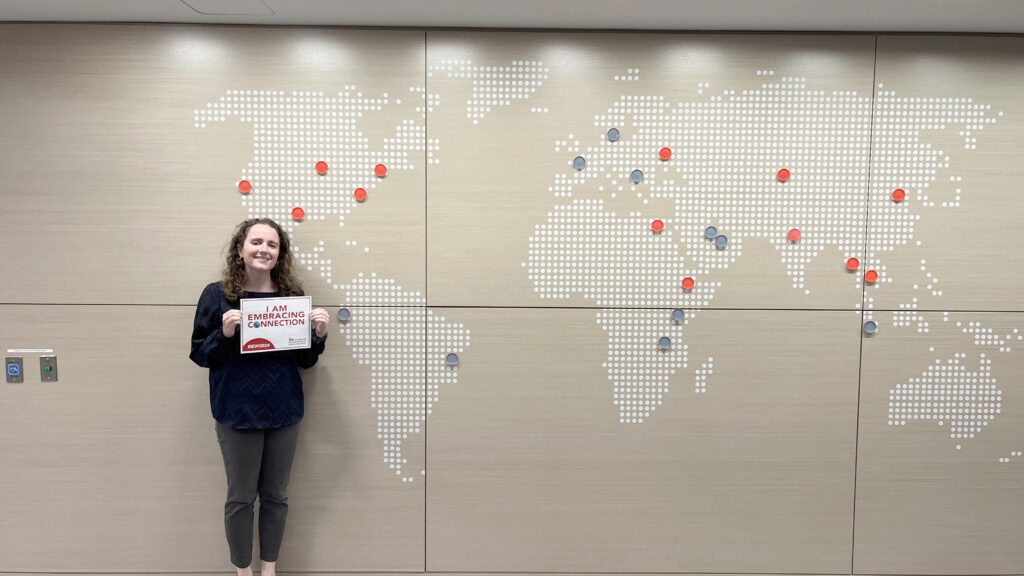
Embracing Connections: A Friendship Based on Curiosity and Mutual Understanding
Before starting her career in international education, Abby Reilly, Global Partnerships and Events Manager for the Benjamin A. Gilman International Scholarship Program (Gilman Program), met an international scholar from India whose friendship changed her life and career path.
The first connection I made in international education set me on an unexpected course, in both my personal life and professional career.
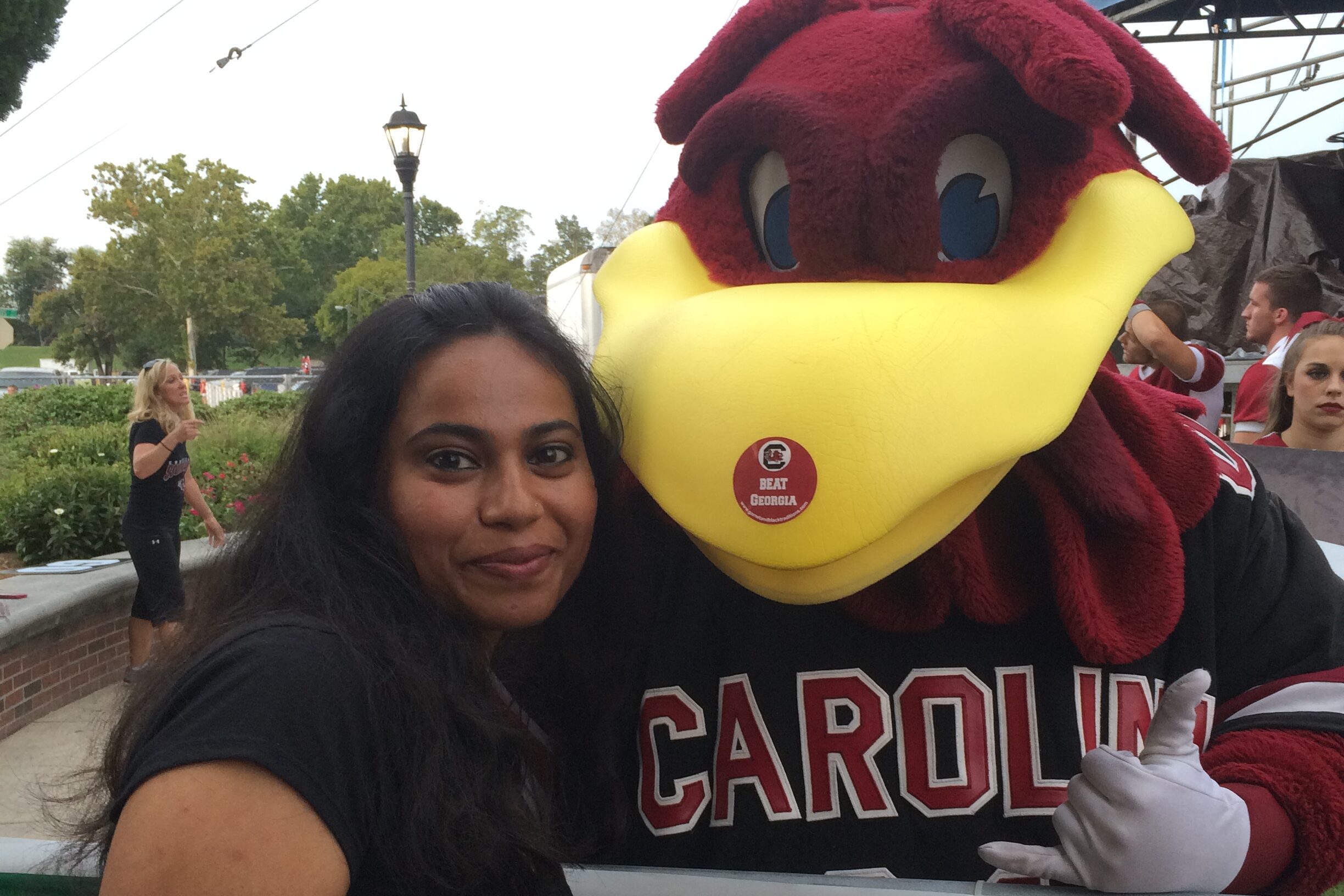
In 2014, as an AmeriCorps*VISTA at the University of South Carolina Aiken, I was placed in on-campus housing with a Fulbright Scholar, Mukulika, from India. The institution only had one person dedicated to study abroad and international student services, so I found myself eagerly stepping in to help her adjust to life in the U.S. What started out as scheduling grocery store trips and other errands turned into movie nights, attending temple, enjoying free concerts at the local park, cooking together (really, her teaching me how to cook!), and exploring the Aiken and Augusta areas. We formed a wonderful friendship, based in curiosity and mutual understanding.
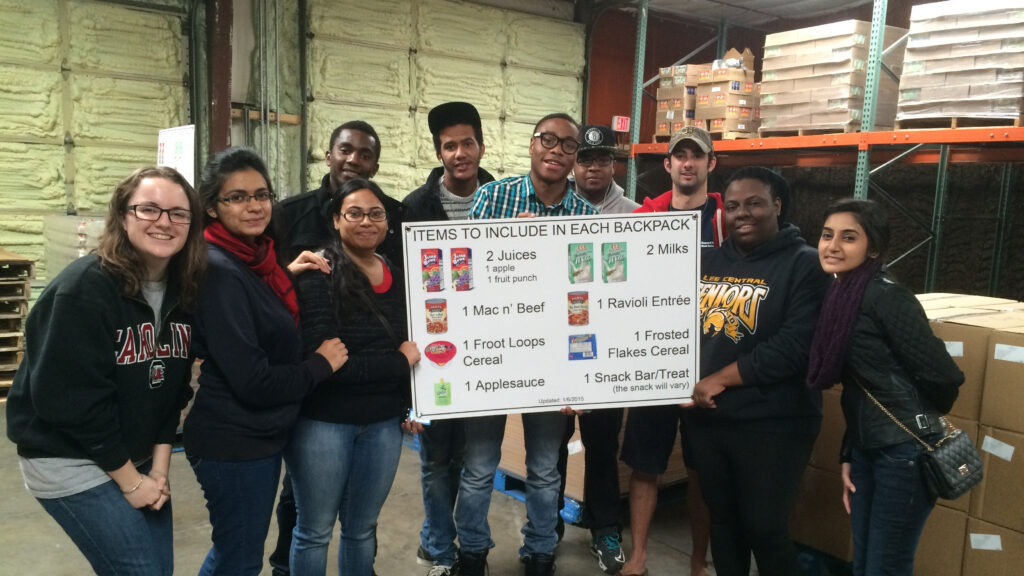
One day, Mukulika asked me to drive her to an event for local Fulbright scholars at University of South Carolina-Columbia, my alma mater. That event happened to be sponsored by the Institute of International Education (IIE). Being exposed to IIE’s mission for the first time that night changed my perspective in many ways. It overwhelmingly affirmed my interest in pursuing a career in public service, but, for the first time, I saw that career path through the lens of international education. As much as I wanted to help people and communities through acts of service, I also wanted to connect with and learn from people. I also learned that even if we speak the same language, we all have much to learn from and teach one another. The connections formed in that kind of exchange can lead to healthy, mutually beneficial partnerships.
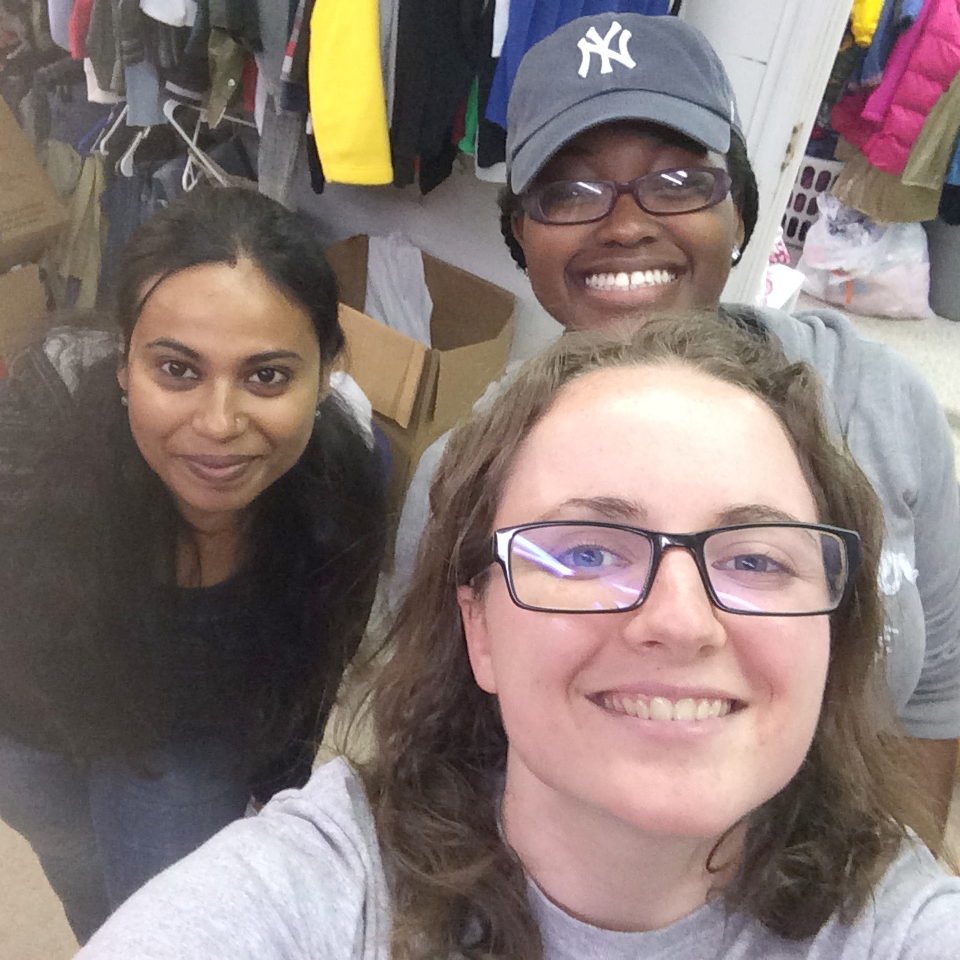
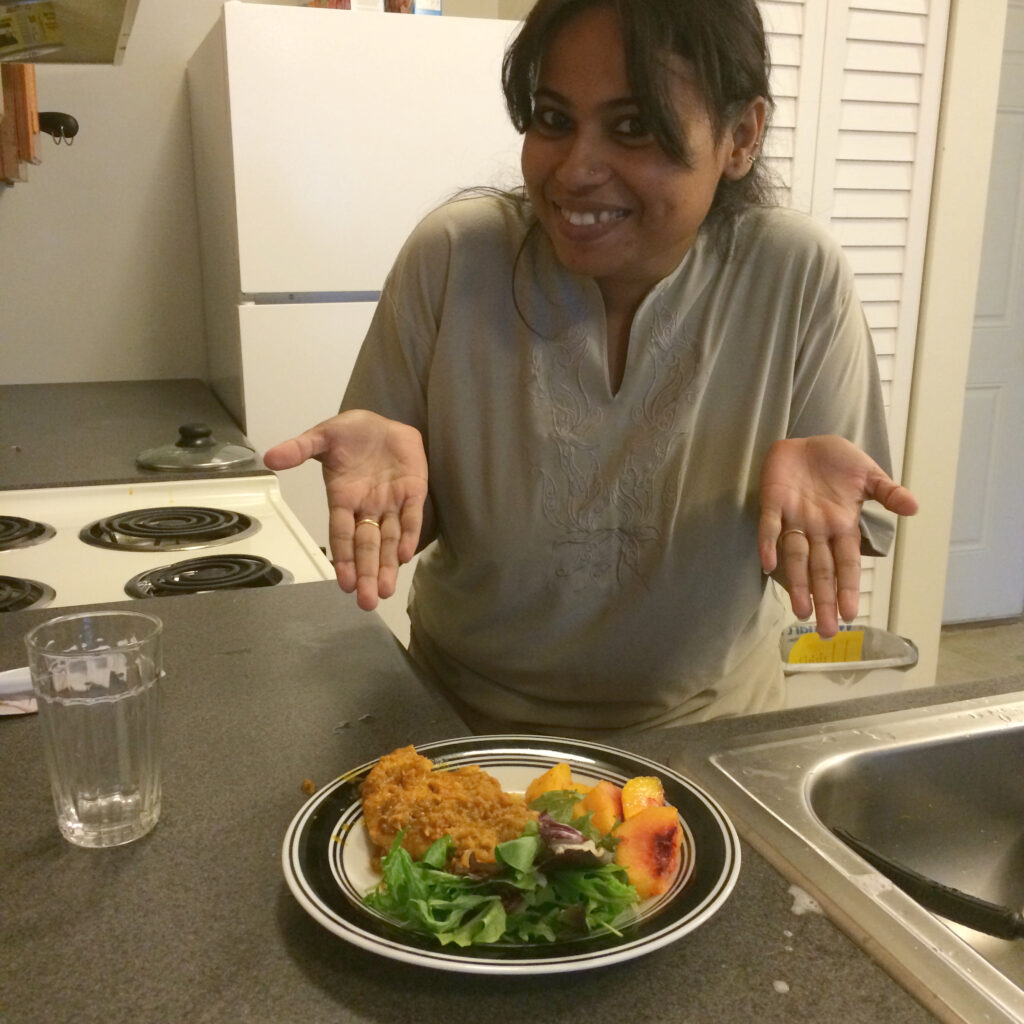
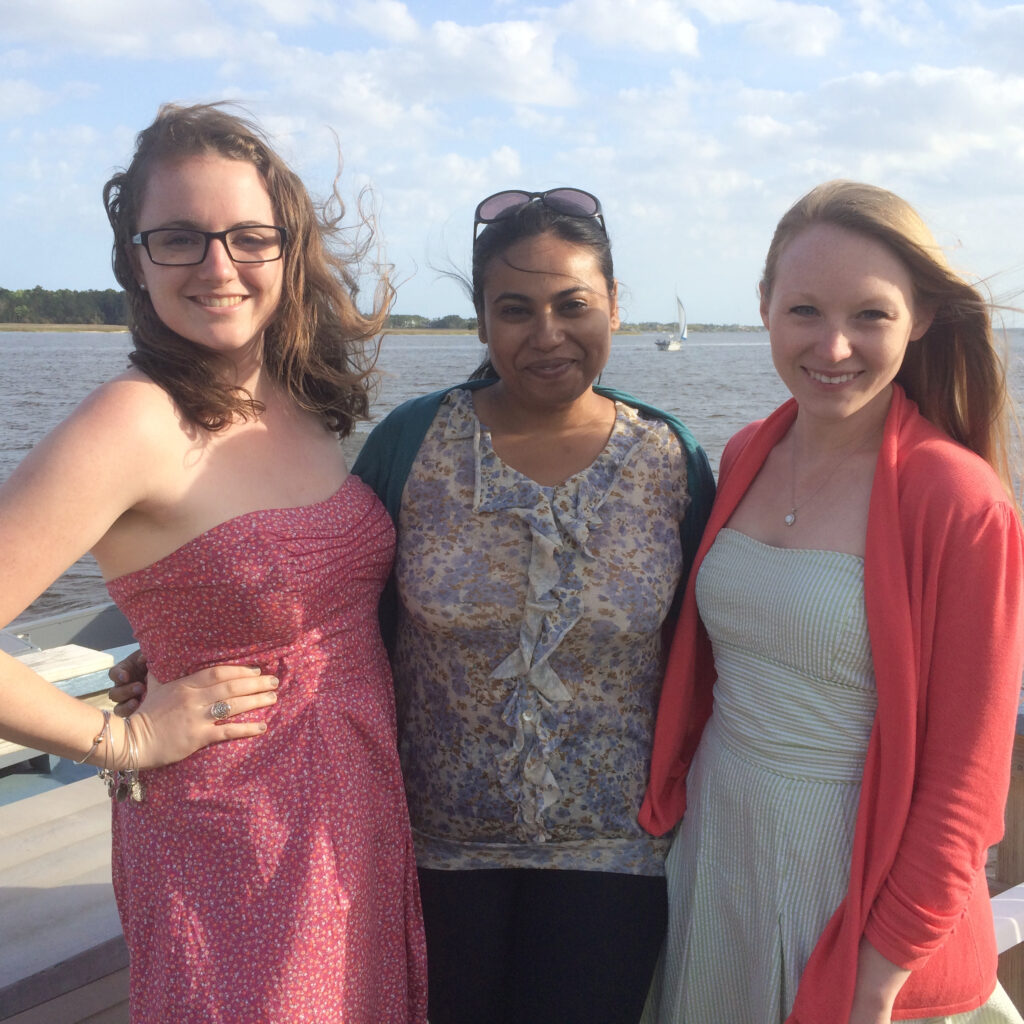
The spontaneous connection with Mukulika further encouraged my empathy and widened the scope of what I thought was possible for myself and others. Initially an introverted, nervous young woman, I was given the courage to explore and travel outside of my comfort zone. Through teaching English in Benin and working in international higher education on U.S. campuses, I learned that education without consideration for the international context is like reading a black-and-white textbook. It’s possible to learn from it, but the depth of understanding, innovation, and creativity that global perspectives and connections naturally bring are missing. Those connections we make across cultures bring the necessary color, texture, and life to our knowledge of ourselves and each other.
Ten years later, I’m now working at IIE as part of the team that supports the implementation of the Gilman Program. I feel so grateful to work with a program that aligns with the beliefs shaped in part by that first connection made with Mukulika. Chief among them: International education shouldn’t be an option, only available to those who can afford it. Rather, it should be accessible to all. Because engagement and exchange on an international scale are essential in shaping the skills and knowledge we need to create an amazing future together.
Is there someone who changed your perspective
A new academic year has begun, promising discovery, excitement, and growth. For the first-year students—undergraduates and graduates—these first weeks on campus mark a moment of profound transformation. It is a time when students forge their academic identities, build social connections, and lay the foundation for future success – both in the classroom and beyond.
In this Fall 2025 issue of the IIENetworker, we draw your attention to the impact of global awareness and intercultural programming at the start of students’ academic journeys. Recently, universities and institutions worldwide have been tailoring first-year experiences to respond to a growing focus on workforce readiness, digital learning environments, and shifting pedagogical paradigms. Our article contributors from across the higher education community demonstrate that in an interconnected world, students must pair academic skills with intercultural competencies and a global mindset from the very beginning of their academic careers.
As a result, this issue:
- showcases how institutions are embedding international perspectives into their programs as early as the summer before the start of the academic year,
- discusses how the integration of global awareness and intercultural learning in first-year curricula can support retention, foster career readiness, and promote holistic development, and
- underscores the importance of intentional design and forward-thinking leadership in creating first-year experiences that resonate across borders.
We hope this edition of the IIENetworker inspires new conversations and collaborations. The transition into higher education is a pivotal moment—and by investing in meaningful, globally informed first-year programs, we support students as they take intellectual risks, face complex challenges, and build their careers.
The semiannual IIENetworker magazine amplifies knowledge and best practices for higher education professionals. Contributors provide strategic guidance and lessons learned from their international education efforts, including building international and academic partnerships, recruiting international students, and advocating for study abroad and student mobility. As a benefit of the IIENetwork, IIE’s global membership association, members can contribute to the magazine and receive copies.
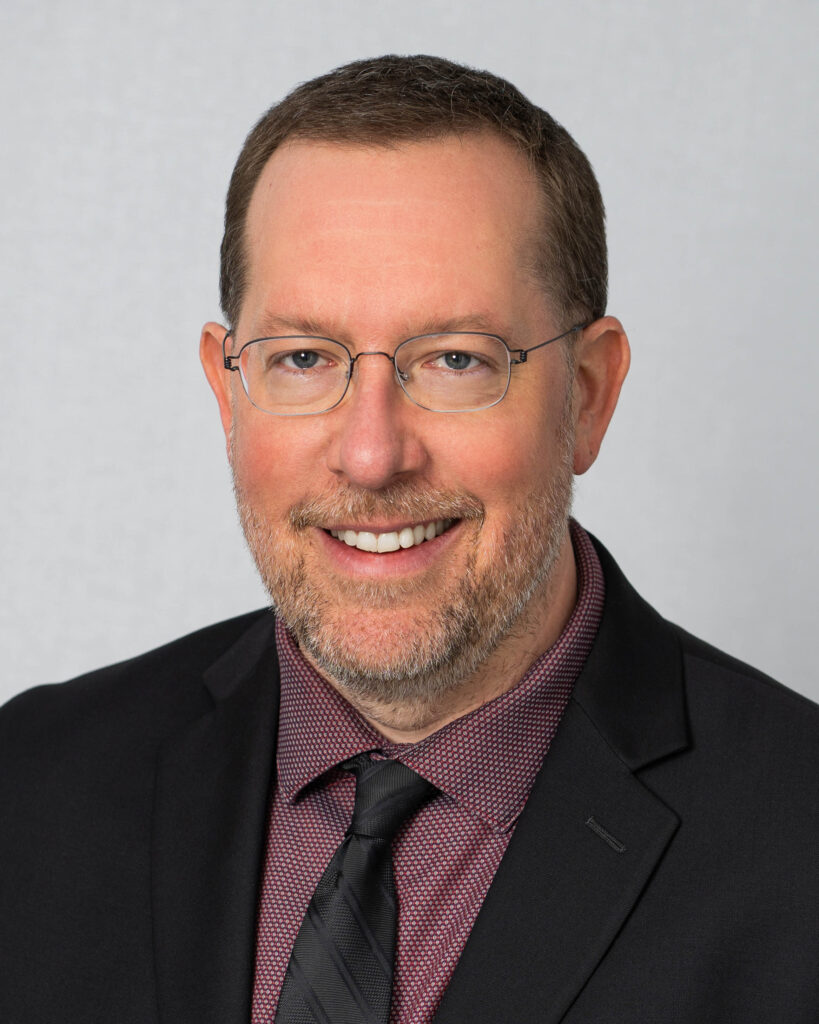
Jason Czyz
President & Chief executive officer, IIEAt my very first NAFSA Conference in May 2025, I spotted a familiar face. It was Rita Rowand, my university advisor who had helped me get to the United States as an international student many years ago. The last time I’d seen her was at my graduation, and here I was, now working in international education—the very field that had transformed my life.
But getting here required a leap of faith that once felt impossible.
I first met Rita when I was attending a U.S. university branch campus in the United Arab Emirates (UAE), my first stop studying abroad from Nigeria. Two years into my program, the university was discontinuing operations, and we were given two options: transfer to another university in the UAE or make the jump to the United States.
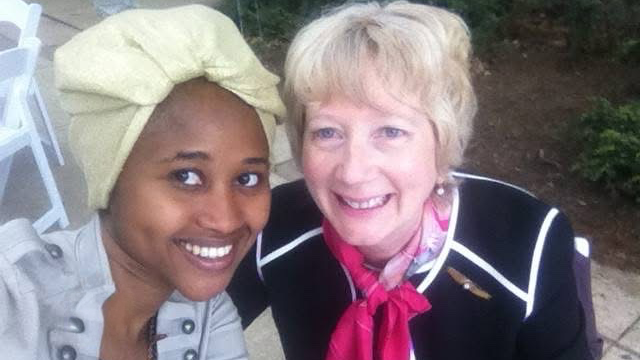
At first, I leaned toward staying with the familiar: transferring to another university within the UAE. I had made genuine friendships, established routines, and built a life. If homesickness struck, a six-hour plane ride could take me back to the comfort of my birthplace. Why venture into an unknown territory?
“You will grow and find opportunities you never thought of,” Rita told me during one of our advising sessions. She encouraged me to step out of my comfort zone, to trust that I was capable of more than I realized.
Despite my fears and doubts about navigating an entirely new country, I made the leap. It turns out she was right; I could not only handle but thrive through such a big change.
In the United States, I continued learning how to navigate a completely new place with a culture different from what I was used to. For example, I learned to use Fahrenheit instead of Celsius, measure in miles instead of kilometers, write “program” instead of “programme,” and so on.
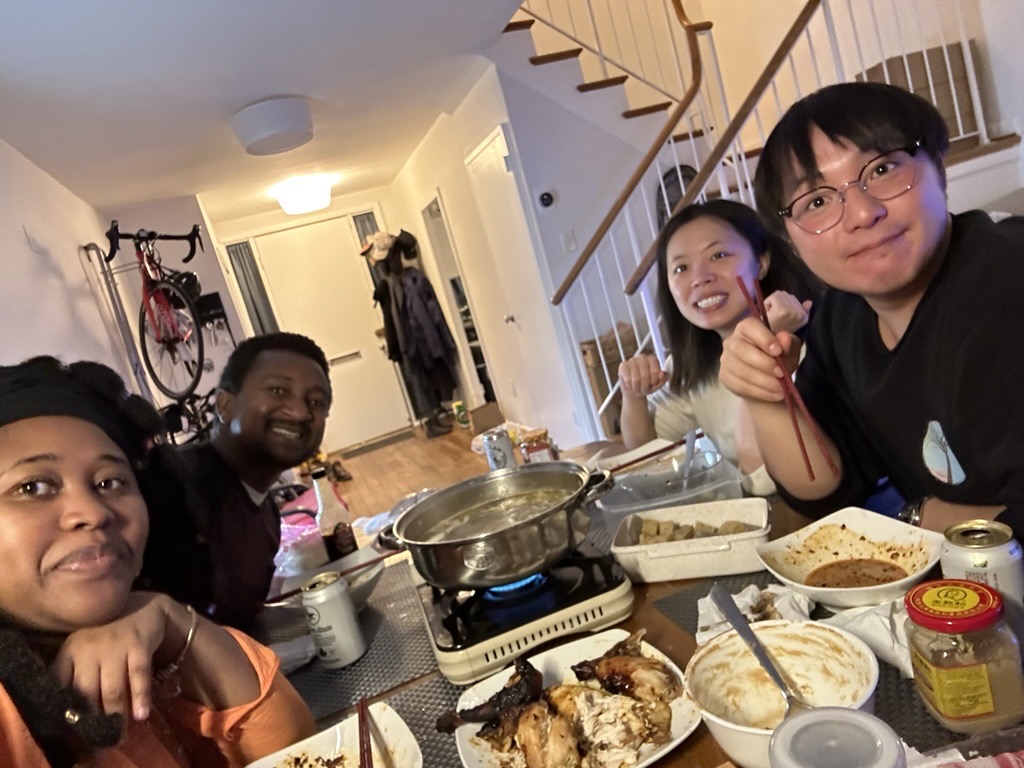


Beyond these adjustments, I discovered food diplomacy—that I can build bridges by bringing a variety of people together, including those who didn’t see eye to eye, around my dinner table to partake in Nigerian cuisine. Toward the end of semesters, when funds were low, my college friends knew they could count on finding Tuwo Miyar Kuka, a Northern Nigerian dish made of rice swallow and baobab leaf soup, at my spot. To this day, whenever I travel back to Nigeria, I still get requests to bring back Yaji, a seasoned pepper spice that I sprinkle on our meals, for my friends.
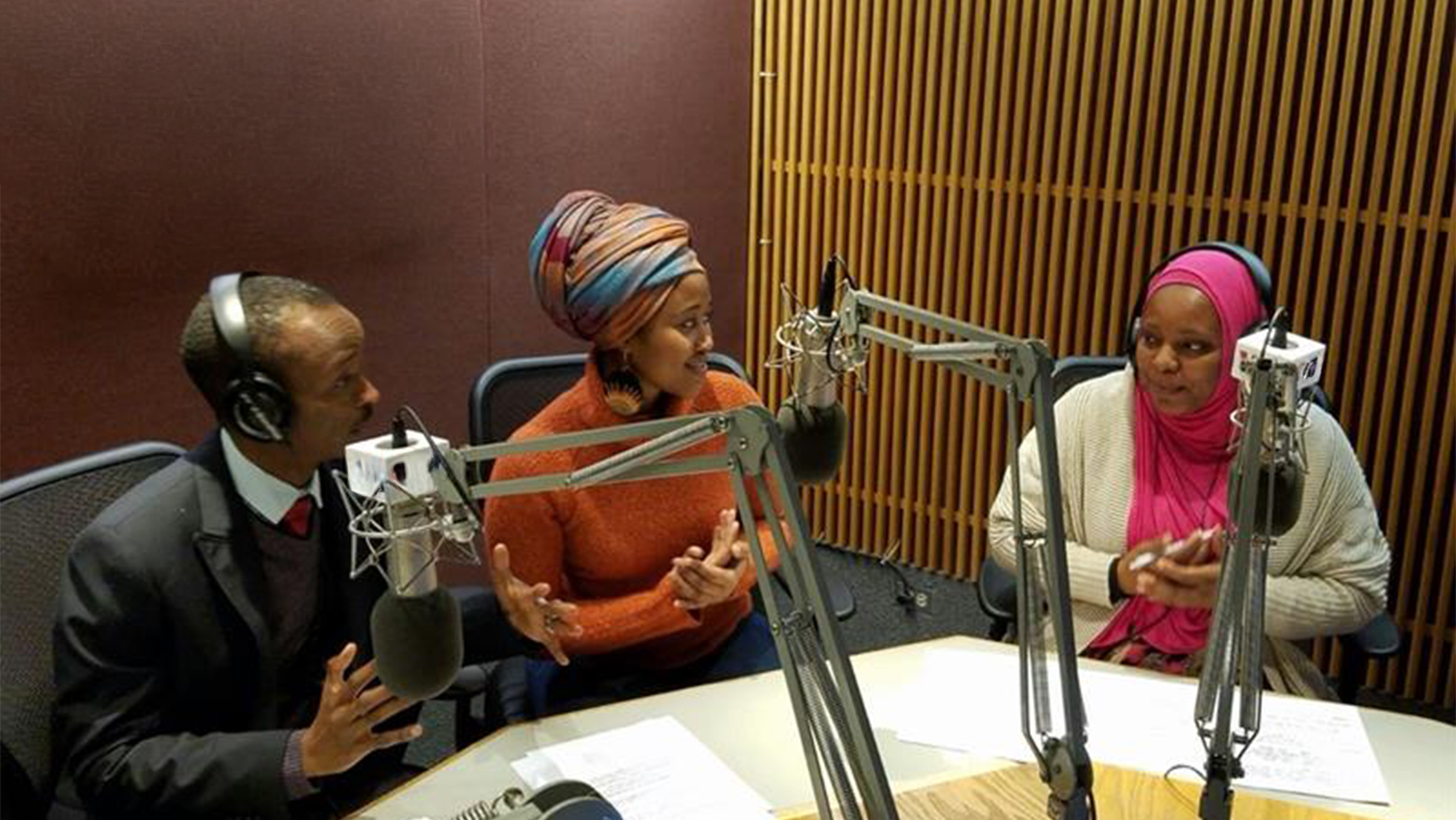
But perhaps most significantly, in the U.S., I discovered a different career path. I arrived thinking I would pursue medicine and become a medical doctor, but exposure to new opportunities led me toward storytelling. I developed what I see as a superpower: the ability to view the world through multiple lenses, which helps me connect to authentically with all kinds of people and understand multiple viewpoints—skills that now serve me daily in my work.
That reunion with Rita at NAFSA reminded me that growth is not a solo journey; it takes a village: the family and mentors who see potential we can’t yet see in ourselves. Now, through my work, I get to pay it forward by promoting life-changing opportunities in the hopes that others will make their own leap towards possibilities.
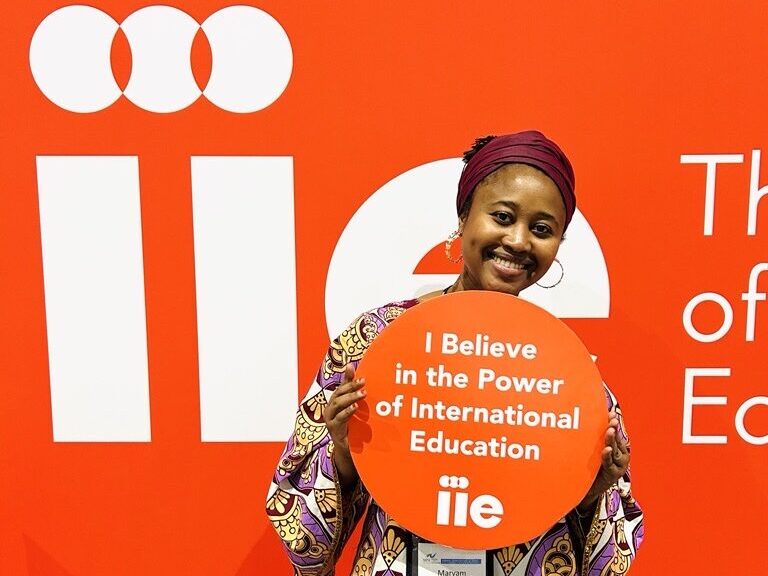
How has a connection you made through international education shaped who you are today?
A New Chapter Begins This Fall
This fall, more than 80 Afghan students are embarking on transformative academic journeys through the Qatar Scholarship for Afghans Project (QSAP). Supported by the Afghan Future Fund (AFF), Education Above All Foundation (EAA), Qatar Fund for Development (QFFD), the Institute of International Education (IIE), and the Yalda Hakim Foundation (YHF), QSAP is restoring educational access for displaced Afghan youth.
Since its launch in 2021, QSAP has helped 400 Afghan students pursue higher education across Europe and North America. This fall’s cohort includes 70 students placed at more than 25 universities, spanning six countries including Albania, Canada, Germany, and the United States. Their majors include cybersecurity, law, accounting, business administration, international relations, and global health—all critically important to rebuild Afghanistan and contributing to global development.
We asked QSAP scholars about their educational and career aspirations, as well as what they’re most looking forward to at their new schools. Their reflections have been edited for brevity and clarity.
Voices of the QSAP Scholars
We asked several students to share their hopes, motivations, and personal stories as they begin this new chapter.
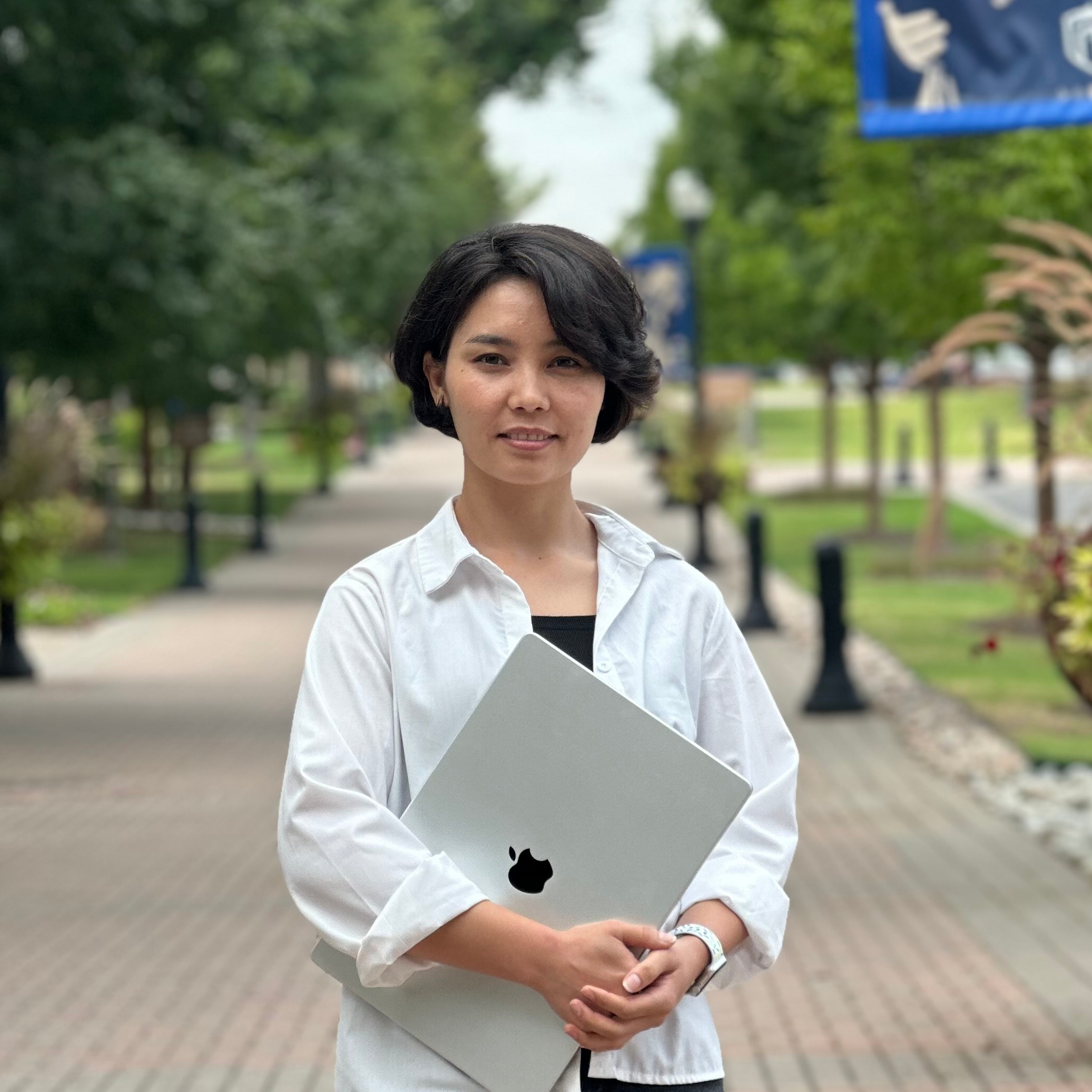
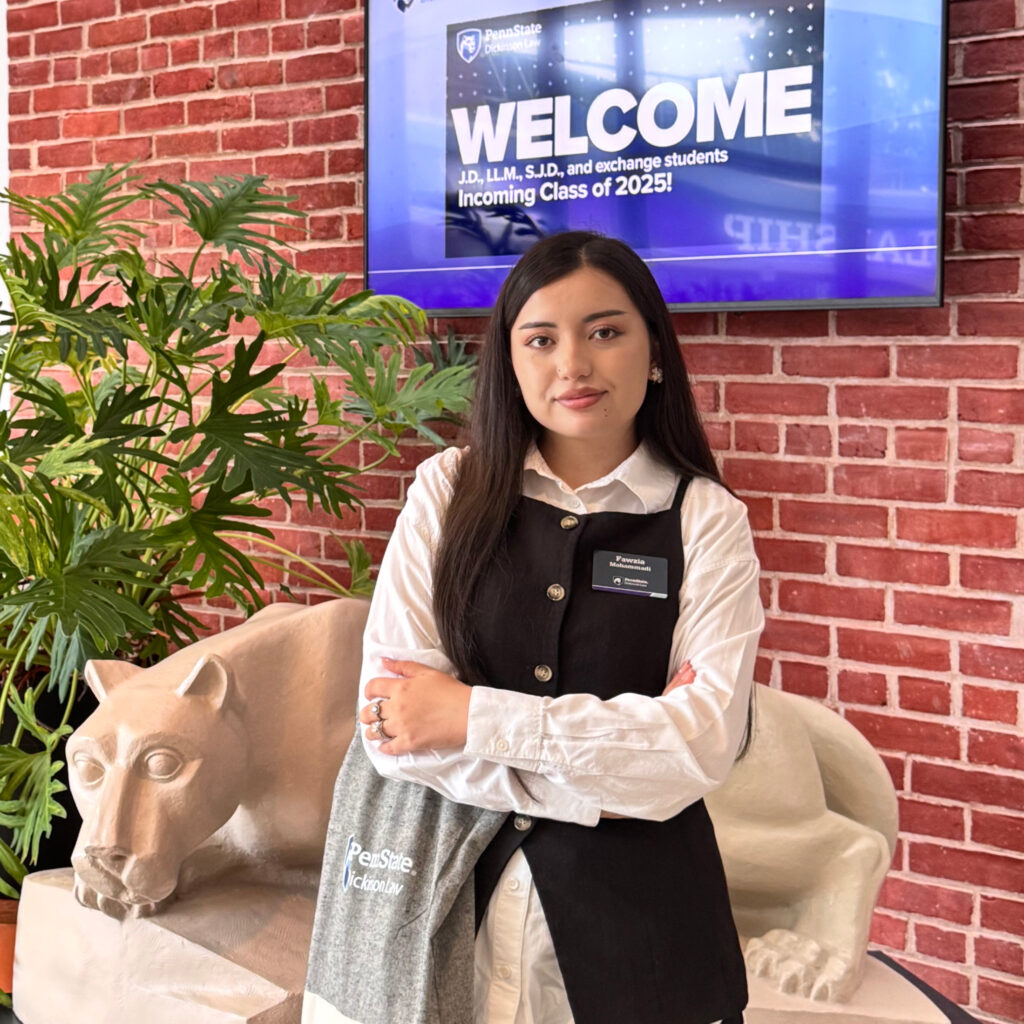
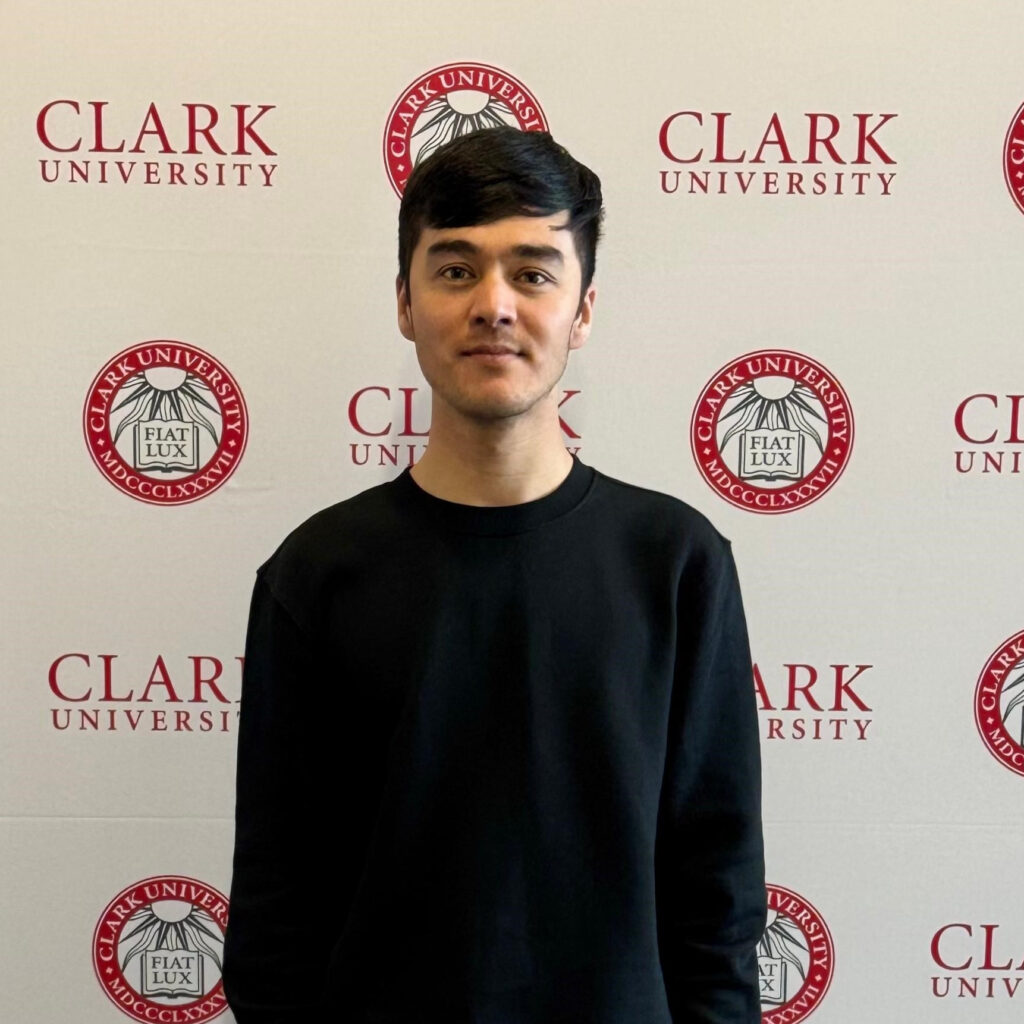
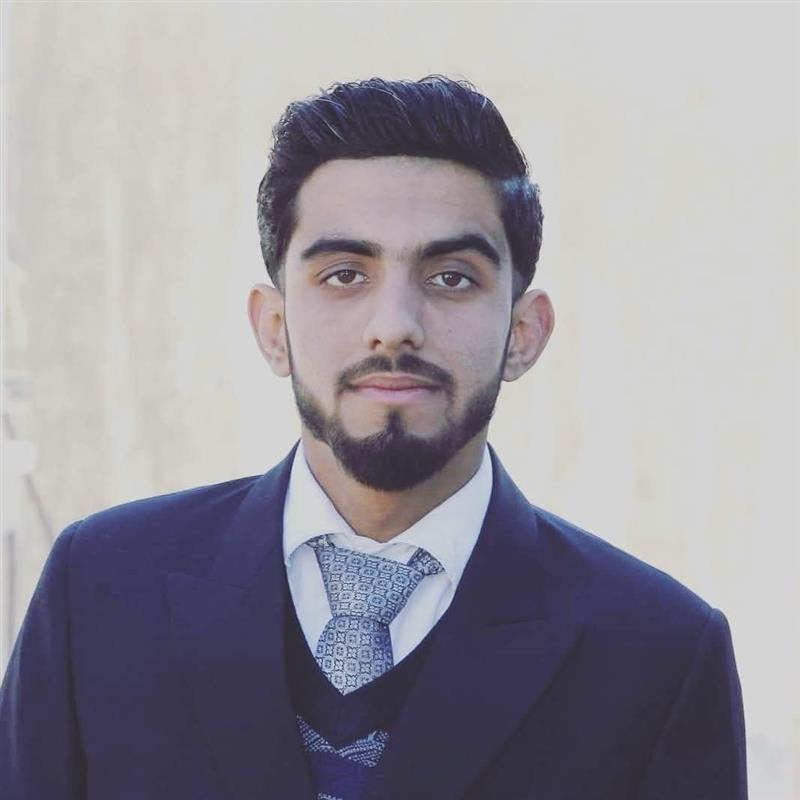
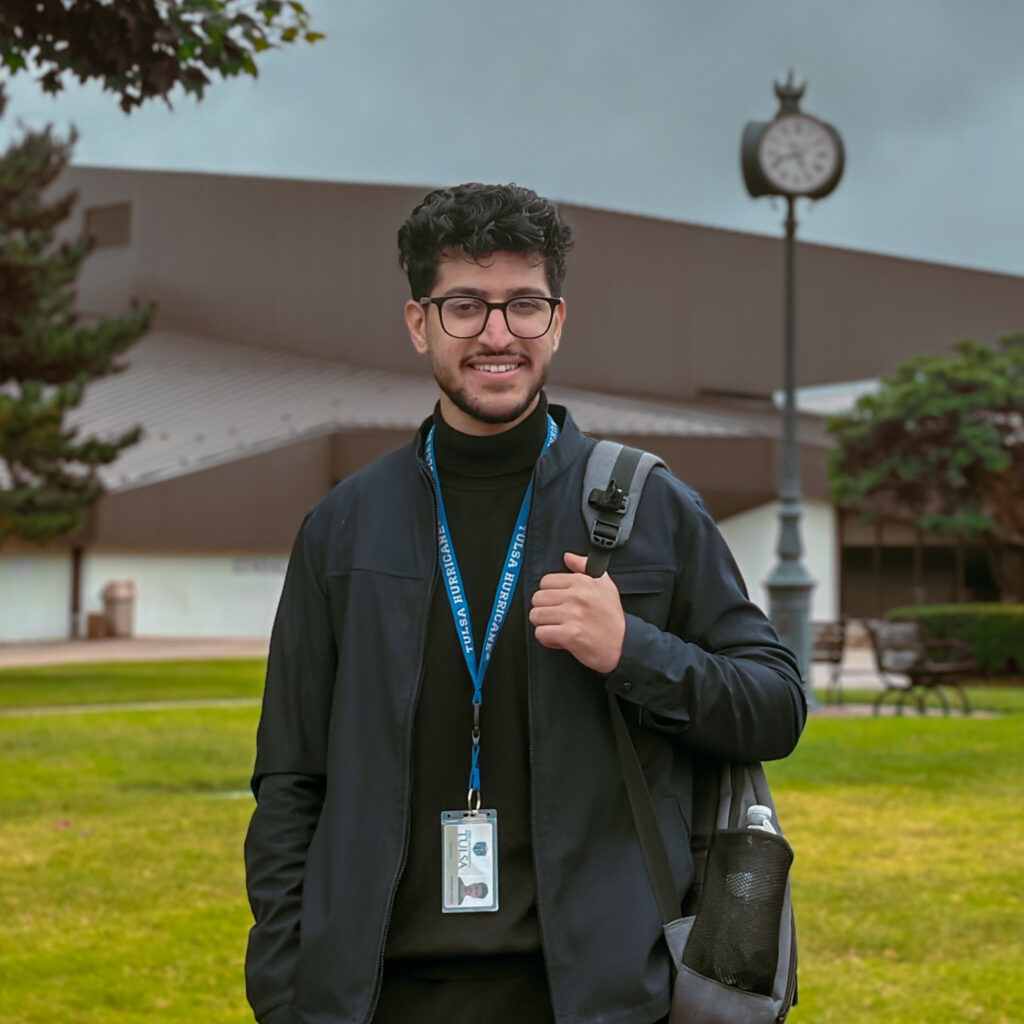
Torpekai Ahmadi | Master’s Student in Computer Science and Cybersecurity, University of Tulsa
“I’m excited to gain hands-on experience and connect with professionals in the field. I chose cybersecurity because I care deeply about protecting digital systems and ensuring privacy. My goal is to support global organizations and safeguard vulnerable communities.”
Fun fact: “I worked as an IT technician during the FIFA World Cup 2022 in Qatar—troubleshooting in the middle of a global party!”
Fawzia Mohammadi | LL.M. Student, Penn State Dickinson Law
“I want to deepen my understanding of law to help build fair and effective legal systems. Coming from Afghanistan, I’ve seen how critical justice and rule of law are to peace and progress.”
Fun fact: “I’m passionate about women’s rights and education and hope to make a meaningful impact in these areas.”
Mohammad Hatif Nadiri | Master’s Student in Accounting, Clark University
“I’m most excited about diving into topics like taxation, auditing, and financial analysis. My dream is to earn my CPA and become a knowledgeable accountant who serves both clients and communities.”
Fun fact: “I used to love soccer, but now I’m falling in love with canoeing and kayaking!”
Hekmatullah Ashraf | Master’s Student in Business Administration and Finance, Binghamton University (SUNY)
“I chose finance because I want to help rebuild Afghanistan’s economy. I’m eager to learn how businesses operate and how financial systems can support growth and stability.”
Fun fact: “I speak five languages—Dari, Pashto, English, Turkish, and Arabic. It helps me connect with people and understand diverse perspectives.”
Rabieullah Naseri | Master’s Student in IT and Cybersecurity, University of Tulsa
“This semester is a chance to deepen my expertise in cybersecurity and work toward launching a cybersecurity firm that not only provides solutions but also raises awareness and educates people about staying safe online.”
Fun fact: “I’m a photographer—I love capturing moments and blending creativity with technology.”
Building Futures, One Scholar at a Time
QSAP is more than a scholarship—it’s a lifeline for Afghan youth seeking stability, education, and purpose. These students are not only pursuing academic excellence but also becoming global citizens, advocates, and future leaders.
As they begin their studies, they carry with them the hopes of their families, communities, and a vision for restoration and innovation at home.
Follow the journey of QSAP scholars on the IIE Opening Minds Blog and learn how education is transforming lives and shaping a brighter future for Afghanistan.
Before launching his career in international education, Lewis Cardenas (above, center), EducationUSA Regional Manager for South Asia, was inspired by his college professor, Dr. Emanuel Yewah, who led a course, Africa: Myth and Reality. To kick start our Embracing Connections series, Cardenas shares how a college course transformed his world view and instilled an appreciation for education abroad.
One person who had a profound impact on my life was Dr. Emanuel Yewah, Professor of French and Comparative Cultural Studies at Albion College. A native of Cameroon, Dr. Yewah specialized in the literatures and cultures of French-speaking communities, with a focus on Africa and the Caribbean. He earned his Ph.D. in Comparative Literature from the University of Michigan.
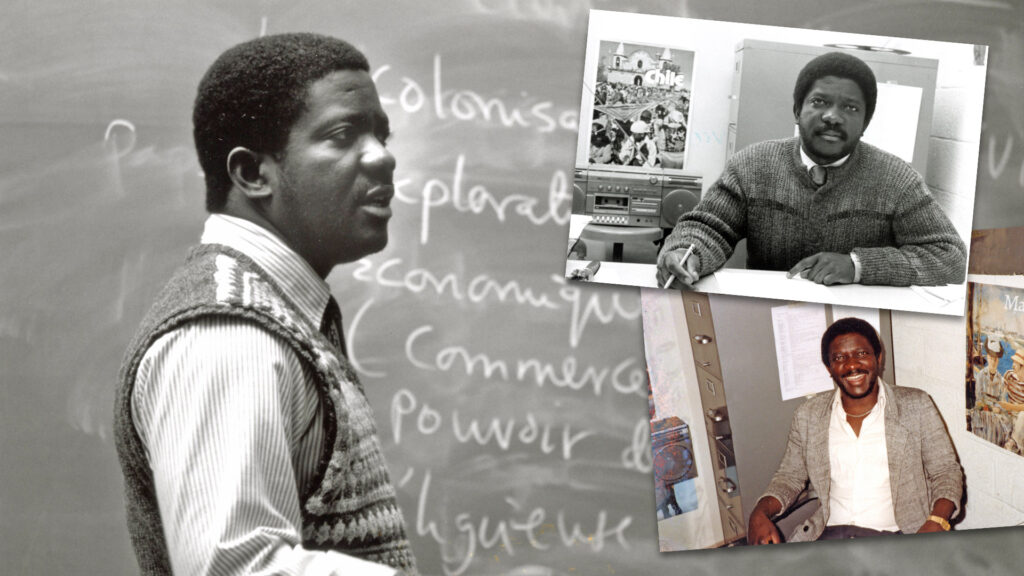
As a first-year student, I enrolled in his seminar, Africa: Myth and Reality. Early in the semester, Dr. Yewah wrote the word “Africa” on the board and asked us to list everything we knew about the continent. We offered the usual stereotypes. He paused, looked at us, and asked, “Do you know when I saw my first lion?” We leaned forward, expecting a story from the savannah. With a smile, he said, “At the San Diego Zoo.” That moment shattered many assumptions and opened our minds.
Inspired by the course, I asked if we could take the class to Africa, like the France trip led by his colleague, which I took part in during my first semester. He doubted Albion was ready, but encouraged me to draft a proposal. I spent the summer between my first year and sophomore year researching flights, mapping itineraries, and modeling the plan after the France trip. By fall 1999, I presented it to him. Based on his expression, I think he assumed I wouldn’t follow through, but to my surprise, he not only read the proposal carefully, but he also brought it forward for board approval.

In the spring of 2000, I served as a teaching assistant for Dr. Yewah’s class, and that summer, we traveled with sixteen students to Cameroon. One of the most memorable experiences was visiting his home village of Batchingou, where we were welcomed by the village king, Chief Andre Flaubert Nana. In a remarkable gesture, the king broke centuries of tradition by personally serving each of us a traditional meal. In his culture, this act was considered taboo, making it an extraordinary sign of respect for our group. One of the dishes served was tripe, which I knew I could not eat. Not wanting to offend the king, I quietly passed my bowl under the table to my classmate Drew, who accepted it without hesitation. The switch went unnoticed, and the visit continued with meaningful conversation and a deep sense of cultural appreciation.
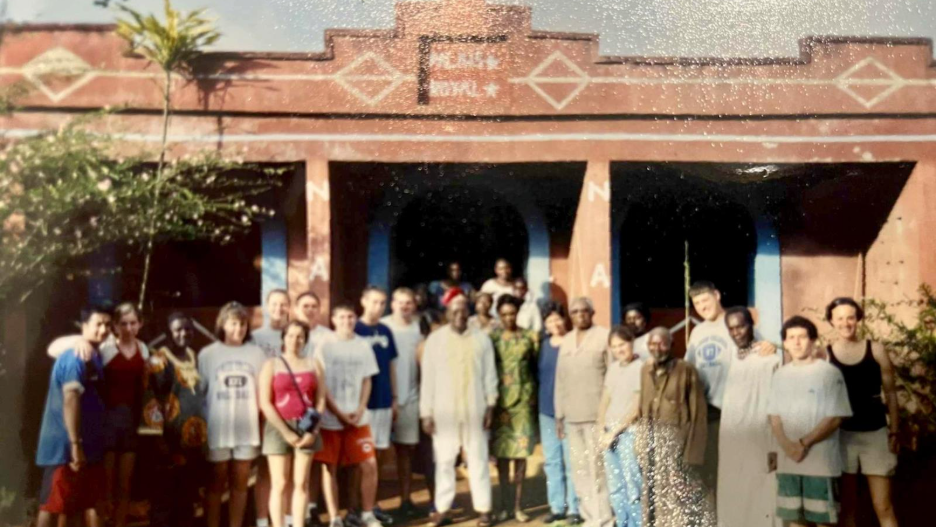
What struck me even more than the meal was witnessing Dr. Yewah’s deep reverence for the king and the customs of his home. Even though he had spent many years away from the village, he maintained the tradition of not standing taller than the king, honoring the values that shaped him. It was a profound lesson in humility, cultural respect, and the enduring strength of heritage.
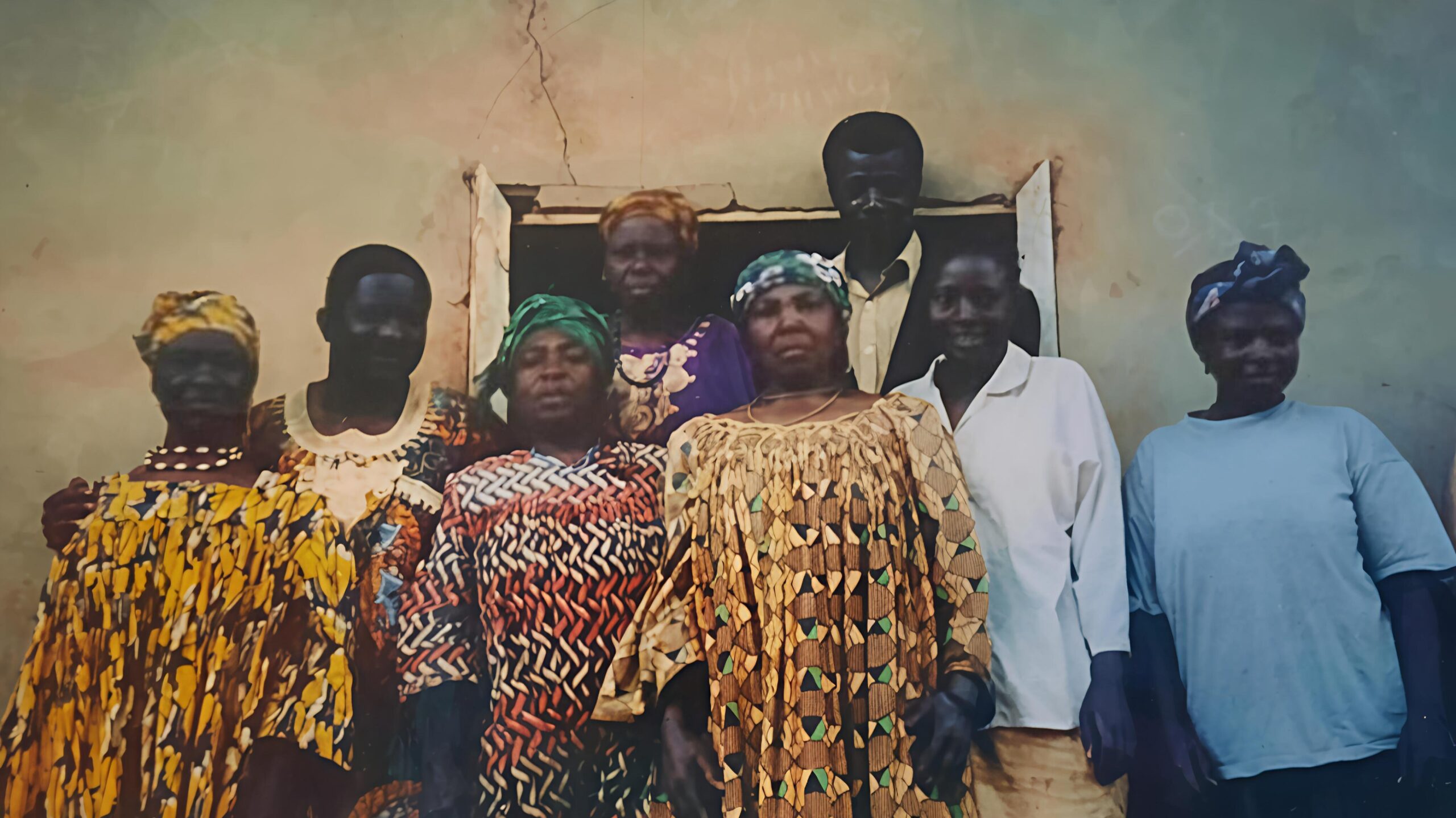
Over the years, Dr. Yewah led ten student groups to Cameroon, offering experiences that included dinners with Chief Nana, visits with local schoolchildren, tours of cultural landmarks, and explorations of the Cameroonian coast and countryside. These trips inspired the creation of Albion’s Nwagni Project, which raised funds to rebuild and support an elementary school in Batchingou.
Dr. Yewah retired in the summer of 2025 as Albion’s most senior faculty member, having opened generations of students to new ways of seeing the world. His legacy is a testament to the impact he had on the minds and hearts of his students.
Is there someone who changed your perspective?
Latin America is home to extraordinary talent. Yet many high achieving students in the region are not aware of the global opportunities available to them, or may believe these opportunities are out of reach. As an outreach officer for NYU Abu Dhabi at IIE’s Latin America & Caribbean office, I have the unique opportunity to work at the intersection of education, opportunity, and global understanding. My role is to bridge that gap: to ensure that students, families, and educators across Latin America understand that NYU Abu Dhabi is both accessible and supportive, in addition to being academically rigorous.
Much of my work involves building relationships with high schools, counselors, and community organizations across the region. I host webinars, visit schools, and engage directly with students and their families to guide them in the admissions process and help them navigate the journey toward an international education.
Recently, I traveled to Quito, Ecuador—known as the “middle of the world” for its location on the equator—where I had the privilege of meeting students from diverse backgrounds and regions across the country. From urban schools in the capital to smaller institutions nestled in the Andes, one thing was clear: talent is everywhere, but opportunity is not. That’s why we reach out to both well-resourced schools as well as students in more remote areas, where international universities rarely visit. These are places full of bright and curious young minds who may have never imagined studying abroad, not to mention in a place like Abu Dhabi.
At NYU Abu Dhabi, students come from over 120 countries. They live, study, and collaborate in a truly global environment, where students are celebrated for their unique backgrounds and perspectives. For many students from Latin America, the experience of being part of this community is both enriching and eye-opening and encourages global citizenship. Our colleagues at IIE play a vital role in bringing information to students worldwide, including across Central Asia, Europe, and parts of Africa. Together, we embody NYU Abu Dhabi’s commitment to reaching the brightest students wherever they are, ensuring that the university continues to attract a vibrant and dynamic student body from every corner of the world.
International education is not just about crossing borders—it’s about building bridges of opportunity. It is a privilege to be part of a team that is preparing future generations to tackle global challenges with empathy, insight, and excitement. Whether I’m walking through the vibrant streets of Quito or visiting schools tucked away in the Andes, I am constantly reminded that global education isn’t defined by geography, but by access, belief, and cooperation.
Learn more about IIE’s work with NYU Abu Dhabi.
About NYU Abu Dhabi
NYU Abu Dhabi is a one-of-a-kind campus in the Middle East, bringing the best of a liberal arts education and groundbreaking research from a top American university. With a rigorous and diverse curriculum, we offer students opportunities to excel in almost every field. Our students come from more than 120 countries, bringing their unique languages and perspectives together in a truly global community.
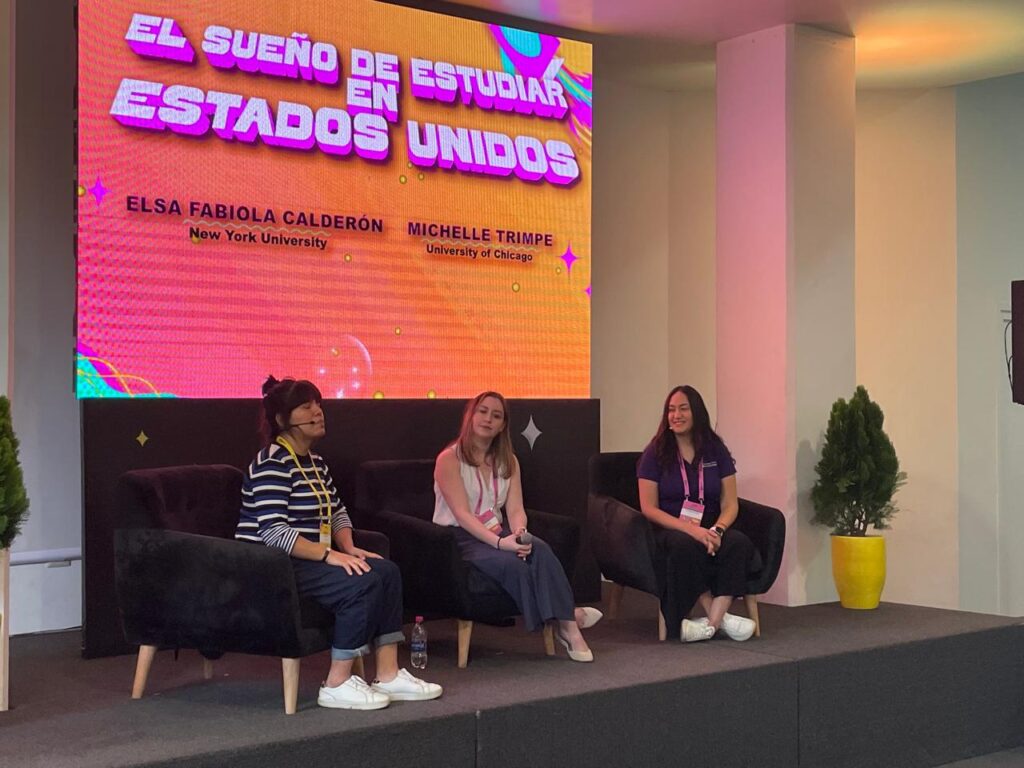
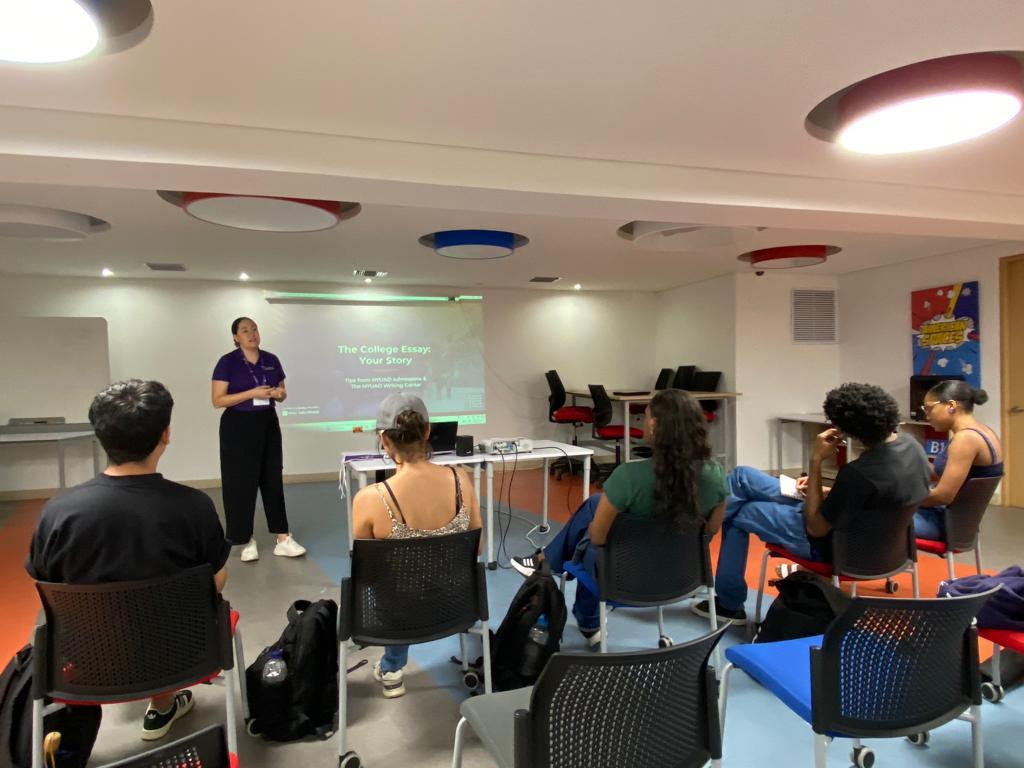
How Oregon State Leverages the IIE American Passport Project to Capture Study Abroad First-Timers
Ask any advisor: engaging undergraduate students early in their academic careers is an enduring challenge. At OSU, we enroll 38,000 students from 50 U.S. states and 105 countries. OSU is an R1 land grant university, and our diverse students choose from 200 undergraduate and 100 graduate degree programs through our 11 colleges and the Honors College. More than 30,000 of our students are undergraduates: 24% are first-generation to attend college, 29% are students of color, and 32% are Pell-eligible. There are several assumptions that cause students, especially first-generation students, to self-eliminate from applying for national scholarships—prevailing ideas are that these opportunities belong to students from elite institutions and with 4.0 GPAs. Over many years of engaging in this work, we have found a few strategies centered on mentorship, good communication, and intentional outreach. However, our most successful strategy has always been when students can get to know us through one-on-one interactions and building a relationship of trust. Motivating a first-year student to walk through our door is still a challenge, especially when they have competing priorities in a large, complex institution.
When IIE sent out the call for American Passport Project applications, I shopped it around campus—the study abroad, educational opportunity program (EOP), and other offices—imagining what a great opportunity this would be for our first-year students, especially those with high financial need. A U.S. passport is a powerful document that alleviates multiple barriers to participation in international experiential learning, and shifts students’ mindsets to a broader, more global scope of their undergraduate experiences and beyond. It occurred to me that this opportunity could be the key I’d been seeking to unlock engagement with first-year students: recipients of an IIE American Passport Project scholarship could be competitive applicants for the Gilman Program and potentially many other scholarships!
We applied for and received the IIE American Passport Grant and launched the program in 2023. In honor of OSU’s mascot, the beaver, we affectionately named the scholarship “Get a DAM Passport” and started outreach to first-year and first-year transfer students in the colleges of Agricultural Sciences and Forestry. The initial grant offered funding for 25 scholarships, and allowed us the opportunity to pilot the concept, create infrastructure for the application, selection, and award processes, perform assessment, and initiate a fundraising campaign to launch the program university-wide. We also created a self-paced Canvas course to assist recipients with obtaining their U.S. passports and connecting with our services to apply for study abroad scholarships.
In the two years since receiving our initial IIE American Passport Project grant, we have awarded 189 scholarships of $175 to cover passport fees and photos, an investment of $33,075—thanks to the support of an OSU Internationalization Grant, individual donations, support from the colleges, and matching funds from our Provost. All recipients were either first-year students or first-year transfers, all with high financial need, and representing 11 OSU colleges. To our surprise, 49% of the recipients are distance learners from OSU’s E-Campus. But the most important proof of concept: scholarship recipients are applying for and winning competitive national scholarships! Among our 2023 to 2025 “Get a DAM Passport” recipients, there were:
- 12 Gilman Scholarship applicants
- Five Gilman Scholarship recipients
- One Critical Language Scholarship applicant
- One Udall Scholarship recipient
- One Goldwater Scholarship recipient

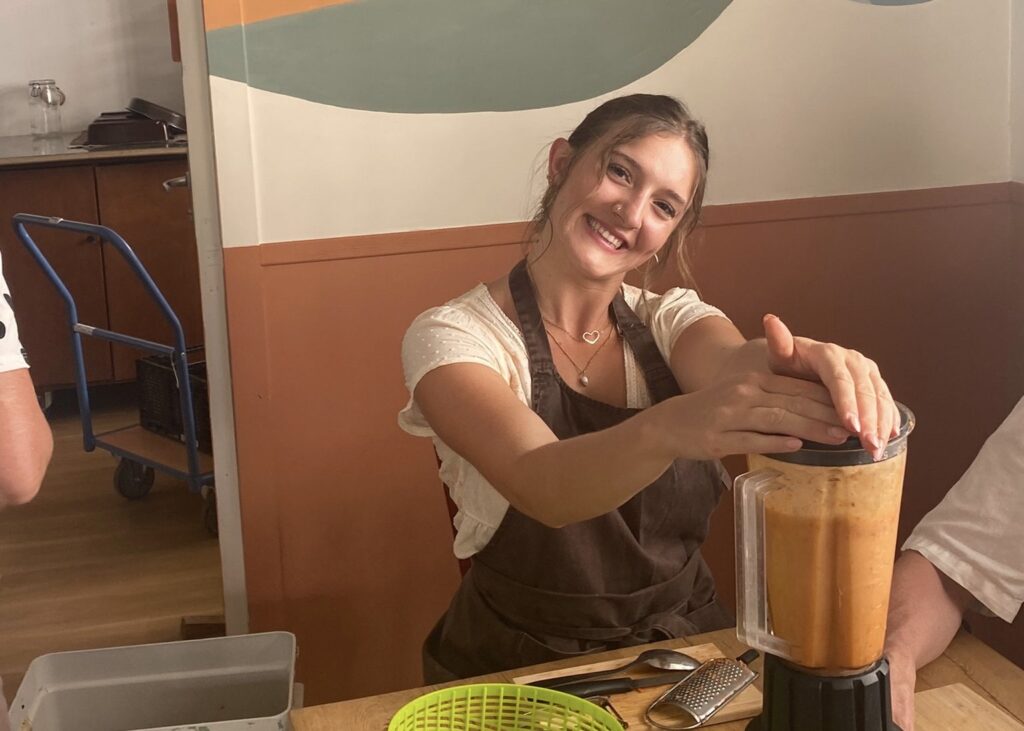
I truly cannot explain how grateful I am for this scholarship and the ability to be able to travel abroad… Financially getting my passport was not very feasible, let alone paying for the trip itself, but both scholarships opened the world up for me to explore. During my time in Lyon our focus on systems thinking within commodities, food production, agriculture, climate change, and energy expanded my knowledge of the world and how each of us can impact one another. I learned that we are not just citizens of our own little piece of the planet, but citizens of the entire world.“
Elana Mansfield, OSU Student and “Get a DAM Passport” scholarship recipient
In a short amount of time, we have served students who may not have otherwise considered applying for national scholarships. We are actively identifying candidates among our applicants and recipients, doing personalized outreach and sharing our recipients’ study abroad aspirations with our global opportunities office. Through our low-cost “Get a DAM Passport” program, we have successfully formed relationships with first-year students and encouraged and supported them in pursuit of competitive national scholarships. We are grateful to IIE for the opportunity to pilot this concept with the American Passport Project.
Learn more about the impact of OSU’s “Get a DAM Passport” initiative.
This summer, IIE was honored to join the Oxford QFI Research Forum, a global convening of researchers, educators, and advocates dedicated to advancing Arabic language education. Held at the University of Oxford, the forum showcased the transformative potential of connecting academic research with classroom practice.
The opening session set a tone emphasizing the forum’s dedication to bridging the gap between research and classroom practice. This principle was exemplified in the inaugural panel featuring the Survey of Arabic Language Programs, a joint initiative between Qatar Foundation International and IIE that examines Arabic instruction by gathering essential data through surveys and stakeholder interviews to inform program development and improvement.
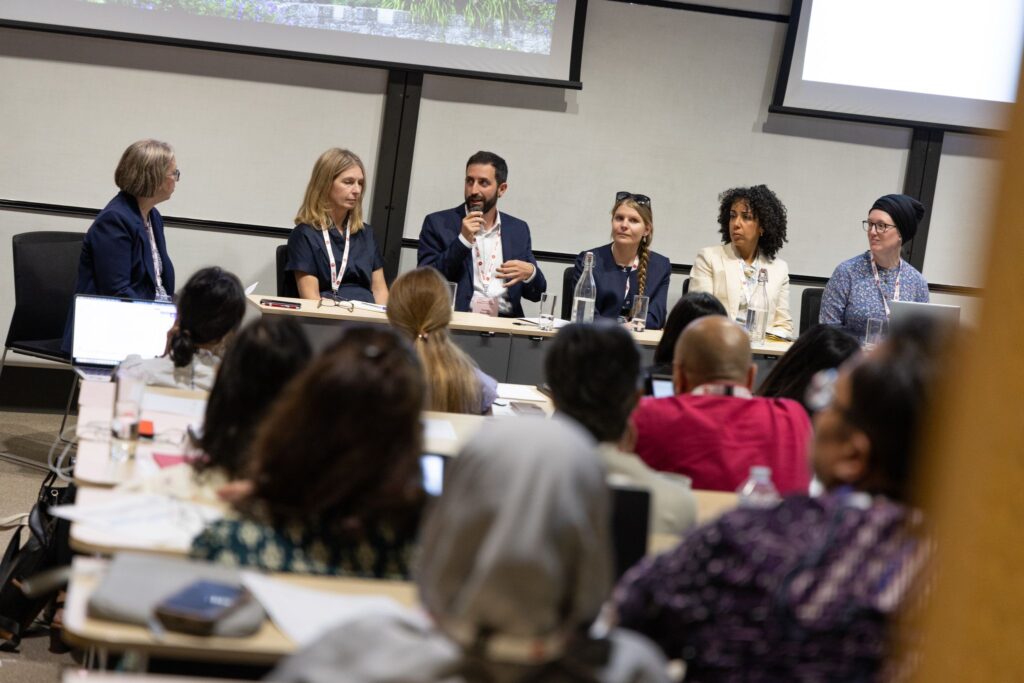
SALP is more than a data-gathering effort. It’s a comprehensive study of Arabic language instruction across six countries: Canada, Ireland, Italy, Sweden, the United Kingdom, and the United States. Through targeted surveys and in-depth interviews with stakeholders, the project is building a nuanced understanding of how Arabic programs operate, the challenges they face, and the opportunities for growth.
Panelists emphasized a key takeaway: when researchers understand classroom realities and educators apply research-informed strategies, the impact is profound. The result is stronger student engagement, more effective teaching methods, and sustainable Arabic language programs that support learners over time.
The second day of the forum highlighted the value of cross-linguistic collaboration. In the session titled “What Can We Learn from the Chinese Experience?” participants explored how lessons from Mandarin Chinese instruction could inform Arabic language education. The discussion revealed shared challenges—such as limited instructional time, varied student progress, and the need for robust teacher training—and generated practical strategies that educators can adapt to their contexts.
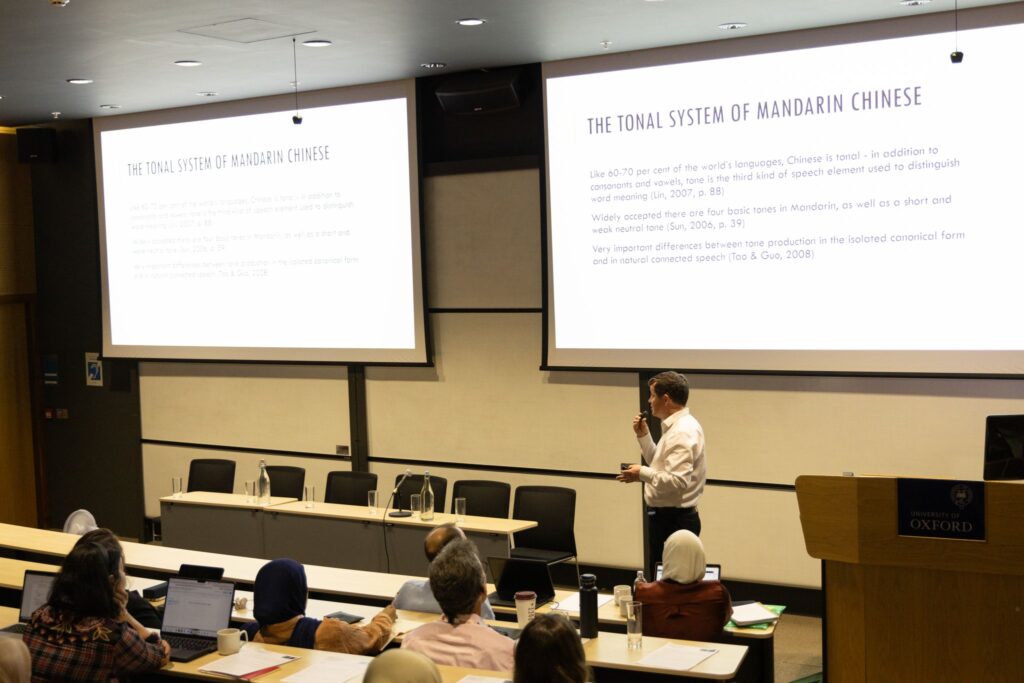
Another session focused on student motivation, exploring why learners choose Arabic and how programs can sustain that interest. By integrating research findings with real-world teaching experiences, participants identified two key drivers: meaningful cultural connections and clear career pathways. They also examined barriers to engagement, including outdated teaching methods and perceptions of Arabic’s difficulty.
The SALP project reflects a strategic partnership between QFI and IIE aimed at long-term educational improvement. As Jonah Kokodyniak, IIE executive vice president, noted, “Partnering with QFI on this important study marks a significant milestone for us and the field of language studies. The SALP Research Project will provide valuable insights to help develop more effective Arabic language programs, ultimately improving educational outcomes globally.”
Using mixed methods, SALP delivers the kind of in-depth analysis that can inform policy and practice. Beyond counting programs or students, the research examines teaching methodologies, policy frameworks, program structures, and demographic contexts. This approach uncovers the insights and interconnections that shape program success.
Once Facing Uncertainty in Afghanistan, QSAP Scholars Deliver Remarks About Resilience and Community This Spring
Photographed above, starting top left clockwise: Mohammad Yosuf Ayni, Tabasum Hamdard, Sayed Eqbal Srosh, Diyana Sharifi, and Shahdukht Tapesh were selected as student speakers.
IIE is proud to celebrate the Qatar Scholarship for Afghans Project (QSAP) Class of 2025. Ninety-eight QSAP scholars graduated from their universities this year, the largest graduate cohort since the program began in 2022. Recognized for inspiring stories of resilience and positive contributions to campus life, five QSAP scholars—Mohammad Yosuf Ayni, Tabasum Hamdard, Diyana Sharifi, Sayed Eqbal Srosh, and Shahdukht Tapesh—were selected as student speakers at their graduation ceremonies this spring. To celebrate the entire QSAP Class of 2025, IIE hosted a virtual commencement ceremony in June. Speakers included Jason Czyz, President of IIE; Talal Al-Hothal, Director at Education Above All (EAA); Wilson Shirley, Afghan Future Fund (AFF) Board Member; Tim Barnes, Executive Director of Partnerships & Research at the University of Kentucky; Sakhi Ataye, Bard College ’25; and Jonah Kokodyniak, EVP at IIE.
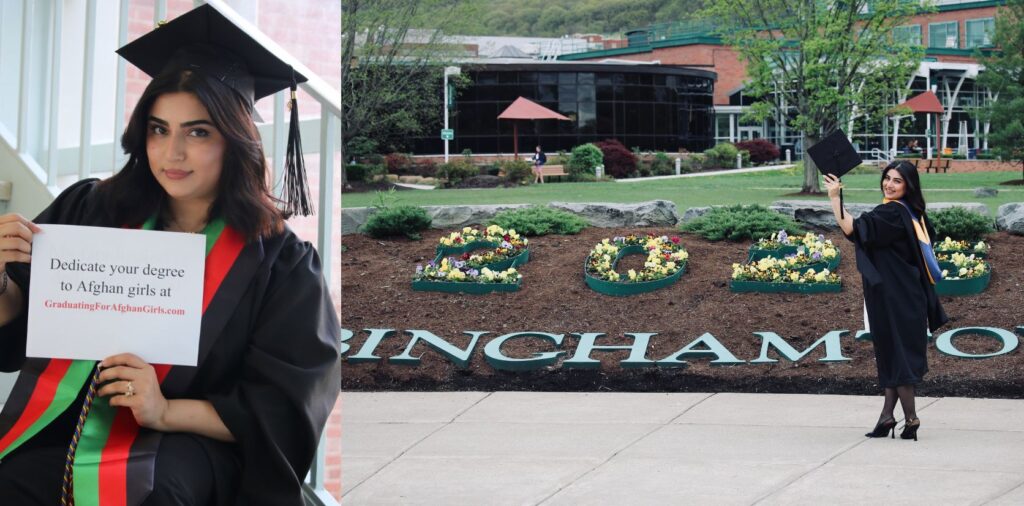
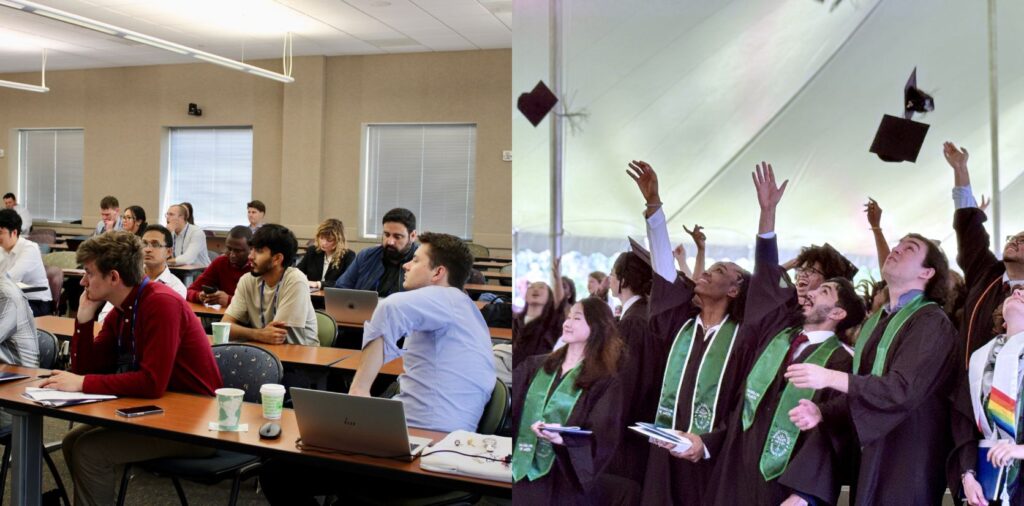
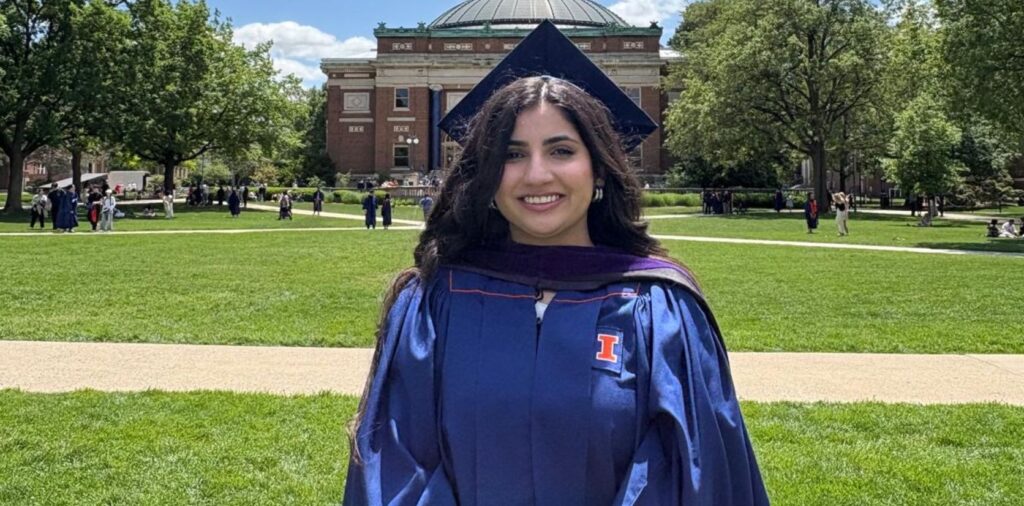
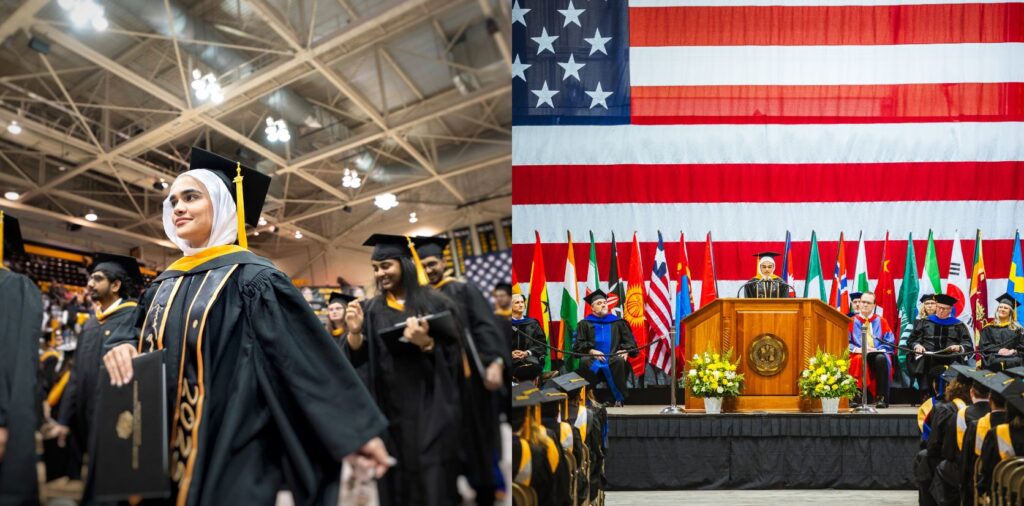
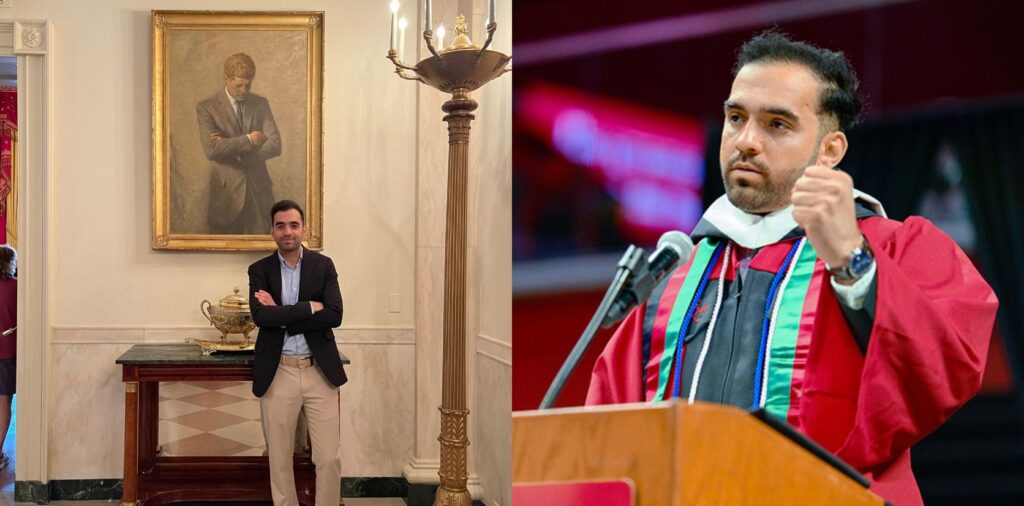
Created to preserve and invest in human capital among displaced Afghan university students, the QSAP program is supported through a collaboration among the Afghan Future Fund (AFF), Education Above All, the Yalda Hakim Foundation, the Institute of International Education (IIE), and the Qatar Fund for Development (QFFD). Scholars receive funds to continue their academic studies outside of Afghanistan.
Below, QSAP scholars reflect on their journeys to advance their education and pay it forward, and share excerpts from their remarks at their respective graduation ceremonies at Bard College at Simon’s Rock, Binghamton University, Michigan Technological University, University of Illinois Urbana-Champaign, and Rutgers University. Reflections have been edited for brevity and clarity.
Mohammad Yosuf Ayni, B.A. in Political Science & International Relations, Rutgers University
Leaving Afghanistan taught me that resilience is transforming pain into purpose—it is having the courage to rebuild your life and to still choose hope. When I learned that I had been selected as a QSAP Scholar, I felt a powerful mix of relief, hope, and validation. After all the uncertainty and loss, I felt seen, not just as a student, but as someone striving to build a new life with purpose.
My education at Rutgers helped me find my voice and understand the power of mentorship, support, and human connection. Being part of QSAP gave me more than academic support; it gave me a community that believed in my potential when I needed it most. I’ve made meaningful connections with other QSAP scholars; we’ve built something meaningful together: a support system grounded in resilience and empathy.
My mission is to create environments where others feel seen, supported, and empowered to thrive. Coming from Afghanistan, I understood early on how deeply governance can impact people’s futures. I chose this path not only to understand systems of power, but to one day enhance them for the benefit of future generations, especially Afghan youth and women, and people who have been displaced around the world.
At Rutgers, I learned that we are not defined by where we come from, but by what we choose to become. I believe our stories can bridge divides, inspire change, and remind others they’re not alone. No matter what challenges you face, your voice has value—and when used with intention, it can move mountains.
Never underestimate the power of your story.”
Mohammad Yosuf Ayni, QSAP Class of 2025
Tabasum Hamdard, M.S. in Data Science, Michigan Technological University
Leaving Afghanistan and putting my MBA on hold wasn’t part of the plan, but I didn’t have time to think about it. I had to act quickly and adapt. When I found out that I had been selected as a QSAP scholar, I was very grateful; the moment felt surreal. The news reminded me that we weren’t alone; someone out there believed in us and was willing to support us. I also felt a strong sense of responsibility. I knew there were thousands of other girls who would have given anything to be in my place. I’ve always felt that I have to make this opportunity count, not only for myself, but also for those who didn’t get the same chance.
Knowing that I can be part of something that actually helps people is what keeps me motivated. Right now, I’m applying what I’ve learned in agriculture and disease modeling. In addition, I organize and host annual WiDS (Women in Data Science) online events to build visibility, confidence, and connection as well as show young women that someone like them made it in the field so they can, too.
There’s comfort in community. Seeing all of us show up again during the online QSAP graduation reminded me that we’re still part of something shared, even if our paths have gone in different directions. Being part of this group makes me feel proud and hopeful for the future of Afghanistan.
My experiences have taught me that letting go of one path doesn’t mean you’re lost; sometimes it’s the only way to make room for something better.”
Tabasum Hamdard, QSAP Class of 2025
Diyana Sharifi, LLM in Corporate Law, Commercial Law, and Trade, University of Illinois Urbana-Champaign
When I left behind my home to pursue my dreams, I finally understood what resilience truly means. It’s about choosing not to give up on yourself, even when the world around you is falling apart. Chasing your dreams often means walking a difficult, uncertain path, but it’s the persistence through those hard moments that shapes who you become.
When I learned I had been selected as a QSAP scholar, I felt a deep sense of happiness and relief. It made me feel seen and supported, and it reminded me that my goals were within reach.
Being a law student at the University of Illinois pushed me out of my comfort zone. I had to quickly adapt to thinking critically, speaking up with confidence, and understanding complex legal reasoning in a new legal culture. I grew more confident in my voice as a legal thinker and future attorney.
Let’s not forget that we are not just graduates. We are advocates. We have learned how to stand up for justice, for fairness, and for those whose voices are not heard. So, wherever we go next—whether it’s a law firm, a nonprofit, or a courtroom—let’s use our knowledge to make a difference. Let’s keep pushing for a world where no one is left behind.”
Diyana Sharifi, QSAP Class of 2025
Sayed Eqbal Srosh, B.A. in Computer Science, Bard College at Simon’s Rock
QSAP wasn’t just a scholarship; it was a second chance at building the future. I’ll never forget the overwhelming relief and excitement I felt as I boarded the plane, knowing that a new chapter was about to begin.
When I arrived at Bard College at Simon’s Rock, I gained a sense of belonging and purpose. I found mentors who genuinely cared, lifelong friends, and a campus where I felt seen and heard. I came to know several QSAP scholars at Bard and across the U.S. Many of us shared parallel experiences: displacement and starting over while pursuing an education. This commonality fostered a meaningful and uplifting support system that offered encouragement, reassurance, and genuine understanding. That spirit of mutual care and shared resilience.
AI can be a powerful tool for expanding access to information in low-resource languages. I see my education as a starting point for service and innovation. I want to build intelligent systems that are both inclusive and secure—tools that support local languages, respect cultural contexts, and protect data integrity. For my thesis, I focused on machine learning and deep learning techniques for analyzing the sentiment of news in Dari, one of Afghanistan’s national languages. Like many low-resource languages, Dari lacks robust AI models or datasets. Automatic translation or sentiment analysis systems can help policymakers, journalists, and NGOs understand public opinion and/or respond to crises in real time. In a country like Afghanistan, this could enable better humanitarian responses or improve access to education and health information.
Throughout my journey, I have learned to value purpose over perfection. Pursuing my aspirations has never been a straight path, but every step has been meaningful.”
Sayed Eqbal Srosh, QSAP Class of 2025
Shahdukht Tapesh, M.S. in Human Rights, Binghamton University
I felt incredibly fortunate to be selected as a QSAP scholar, but that joy was bittersweet, knowing that Afghan girls are now deprived of similar opportunities. Even though I’m far from home, I still carry the hope of one day returning to help rebuild something better. When I delivered my commencement speech, I dedicated my master’s in human rights to all the Afghan girls who have been denied both the right to education and the joy of graduation for the past four years.
As a student, one of the most valuable lessons I learned was how expanding my network could open doors and shape my career path. I was able to reflect deeply and become more self-aware and intentional about my goals. I identified the skills I needed to succeed in the job market and actively used campus resources to develop those skills, graduating equipped and ready to enter the professional world with confidence.
I’m especially committed to addressing the education ban on women and girls in Afghanistan. As someone who has experienced the power of education, I feel a deep responsibility to support those who have been denied that right. I plan to continue developing initiatives like GraduatingForAfghanGirls.com and collaborate with global partners to expand scholarships, create digital learning pathways, and advocate for the restoration of educational access in Afghanistan.
Education is more than a degree—it’s a duty to advocate for those whose voices are silenced.”
Shahdukht Tapesh, QSAP Class of 2025
Supported by the Afghan Future Fund (AFF), Education Above All Foundation (EAA), Qatar Fund For Development (QFFD), and Yalda Hakim Foundation (YHF), the Qatar Scholarship for Afghans Project (QSAP) works to restore educational access for Afghan youth. Since 2021, QSAP has helped approximately 275 displaced Afghan students continue their education at universities in multiple countries.
Academic Leaders Reflect on the Mutual Benefits of Welcoming Threatened Scholars
More scholars than ever before are facing repression, targeting, and violence worldwide; last year, the IIE Scholar Rescue Fund (IIE-SRF) received the second-largest number of applications in its history, surpassed only by 2023. From Sudan and Ukraine to Cameroon and the Gaza Strip, academics are in need of emergency support amidst new, intensifying, and protracted conflicts and crises in their home countries. The global education crisis is growing and urgent—that is why IIE-SRF is activating its global network of more than 500 host institutions to help provide a safe haven where threatened and displaced scholars can continue their work freely and safely.
In this three-minute video, Nishi Dhupa (Associate Vice Provost for International Affairs, Cornell University), Ahmad Dallal (President, American University in Cairo), and Martin Paulsen (Head, Department of Foreign Languages, University of Bergen) describe why their institutions have chosen to host IIE-SRF fellows, including the mutual benefits and impact these scholars have had on their campuses. The video also features Dr. Sharif Hozoori, an IIE-SRF fellow from Afghanistan at Cornell University.
[Caption] Learn more about hosting an IIE-SRF fellow.
IIE-SRF utilizes a highly individualized process to arrange an appropriate position for each fellow to ensure the best possible fit for both the scholar and the host institution, including placing scholars at hosts within their home region when appropriate. By establishing connections with a broad range of host institutions from different world regions, IIE-SRF is able to place fellows at institutions that best fit their academic expertise, linguistic skills, and cultural backgrounds. Regional placements, which in recent years have made up approximately a third of all fellowship appointments, have enabled fellows to better preserve connections with their academic networks and continue contributing to their home academies.
While on their fellowships, scholars contribute to ongoing research or begin original research, complete pending publications, teach or co-teach classes, deliver guest lectures, and/or serve as an on-campus resource to both students and faculty. Host institutions benefit from the opportunity to learn from the scholars’ unique expertise and perspective while also addressing the critical issues facing threatened and displaced scholars and higher education globally. For example, a fellow from Afghanistan helped his host institution revitalize its dormant wheat breeding program; a fellow from Turkey used his passion for teaching to develop new curriculum and inspire students; and a fellow from Ukraine helped her host institution establish a new informatics program.
IIE-SRF is the only global program that arranges, funds, and supports fellowships for threatened and displaced scholars at partnering higher education institutions worldwide, including inside their home regions. Since 2002, IIE-SRF has supported 1,166 scholars from 62 countries in partnership with 522 host institutions in 59 countries. Learn more about hosting an IIE-SRF fellow.